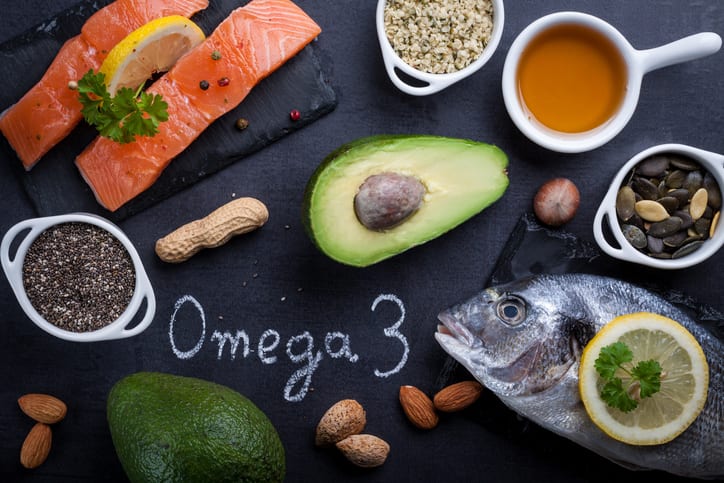There’s been a lot of talk about the importance of omega 3 fatty acids to improve heart health. What’s seldom mentioned is the importance of fatty acids to eye health. This is one fat your body – including your eyes – can’t do without. We know our Florida Eye patients are concerned about their health, so would like to offer a little information on the link between fatty acids and healthy eyes.
What are Fatty Acids?
Essential fatty acids (EFAs) are sometimes referred to as “building blocks” in the body. They’re essential for the proper functioning of organs, nerves, muscles and cells. These fatty acids are often linked to heart health because they are needed to produce a substance like a hormone that helps regulate the heart rate, blood pressure and blood clotting.
Our bodies can’t produce EFAs. They must be obtained from food. The following fatty acids are essential to eye health, particularly good retinal function and vision development.
- DHA (docosahexaenoic acid)
- EFA (eicosapentaenoic acid)
- ALA (alpha-linolenic acid)
How Omega 3 Helps the Eyes
Fatty acids are important for adult eyes in several ways including:
- Helping to protect the eye from macular degeneration. A large study in Europe found that people eating oily fish once a week or more cut in half their risk of neovascular (“wet”) macular degeneration when compared to those who ate less fish.
- Providing some protection against dry eye syndrome. In a study of 32,000 women aged 45-84, eating tuna at least twice a week significantly reduced the risk of dry eye.
- Lowering the risk of glaucoma. EFAs may help decrease high eye pressure by aiding in the necessary drainage of intraocular fluid.
The benefits derived from dietary fatty acids (eating fish) were higher than when the omega 3 was obtained from a supplement. However, if you really hate fish, taking a supplement is a great alternative. Your Florida Eye doctor would be pleased to review your options with you.
Unborn babies require these essential fats for proper eye development, another reason a pregnant woman’s diet is so important. After birth, babies receive EFAs from breast milk and most infant formulas.
There’s an Important Difference Between Omega 3 and Omega 6 Fatty Acids
Your body needs both omega 3 and omega 6 fatty acids for good health. However, as is true of much in life, too much of a good thing can become a bad thing.
The proper ratio of omega 6 to omega 3 is 4 to 1 or less. Of course, it can be difficult to know what your ratio is. However, while you need to be sure you get enough fatty acids from fish or supplements, you’re probably getting far more omega 6 than is good for you.
A typical American diet can have a ratio as high as 30 to 1 or 30 times more omega 6 than omega 3 fatty acids. Remember, the ideal balance is 4 times as much omega 6 as omega 3. This imbalance contributes to many serious eye and health issues, including cancer and heart problems.
Meats and processed foods can contain high amounts of omega 6, sometimes called the “bad” fatty acid. Fried foods can be especially problematic since sunflower, corn and many other cooking oils are not only high in omega 6, but they also create dangerous “trans-fats” at high frying temperatures.
Trans-fats interfere with the body’s ability to absorb essential fatty acids, contributing to the development of heart issues and many other serious diseases. They’re not good for your eyes, your waistline or your overall health.
The Best Omega-3 Foods
Cold water fish are the best source of valuable fatty acids. Wild-caught are normally preferable to farm-raised since they aren’t exposed to such high levels of chemicals and other pollutants. Two servings a week is recommended.
Fish high in DHA and EPA include:
- Salmon
- Mackerel
- Tuna
- Herring
- Sardines
Omega 3 is also available from other foods. Fish is a better source because the body can’t process the ALA omega 3 from vegetables as easily as it processes the DHA and EPA found in fish. Supplements are, of course, a third option.
Non-fish food sources of fatty acids include:
- Flaxseed oil and flaxseeds
- Spinach, kale and other dark green leafy vegetables
- Walnuts
A Few Tips for Better Eye Health
- Use olive oil for salads and cooking.
- Eat more fish and fresh fruits and veggies.
- Avoid processed foods containing hydrogenated oil, often found in snack foods and margarine.
- Eat less red meat and fried foods.
Making sure your diet includes enough fatty acids is one of the best things you can do for your eyes and your overall health. Florida Eye is Tampa Bay’s leader in complete eye care. Contact us today to schedule an appointment.



